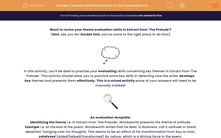Want to revise your theme evaluation skills in Extract from 'The Prelude'?
(Hint, yes you do! Double hint, you've come to the right place to do this!)

In this activity, you'll be able to practise your evaluating skills concerning key themes in Extract from 'The Prelude'. This activity should allow you to practice some key skills in detecting how the writer develops key themes and presents them effectively. This is a mixed activity some of your answers will need to be manually marked!

An evaluation template:
Identifying the theme i.e. In Extract from 'The Prelude', Wordsworth presents the theme of solitude.
Example i.e: At the end of the poem, Wordsworth writes that he feels "a darkness, call it solitude or blank desertion" hanging over his thoughts. This seems to be an effect of his transformation from boy to man, catalysed (aided/helped/transformed) by nature, which is a driving force in the poem.
Effect i.e. Wordsworth uses a semantic field of solitude, near the end of the poem, to back up this theme. Words such as "solitude", "desertion" and "serious" alongside the repetition of personal pronoun "my" really emphasises Wordsworth's feelings of being alone and isolated from the world.
Linking the theme to the poem as a whole i.e. The theme of solitude comes at the end of the poem, which really reinforces Wordsworth's transformation as if contrasts with the more pleasant and lighthearted language at the beginning of the poem. Words such as "pleasure", "sparkling" and "proud" transform into words such as "dim", "grave" and "darkness" which showcase Wordsworth's shift inward.

Don't worry about making your evaluations super complex and don't get too intimidated by the example up there. It's more sophisticated so that you have a super example to look up to and work towards!
Hopefully (fingers crossed) this makes evaluating themes easier to understand. If it's still tricky, don't worry because the activity will be filled with helpful hints and explanations that you can jot down as you do it.
Remember, take your time, it's not a race!
You should always refer to your own text when working through these examples. These quotations are for reference only.







